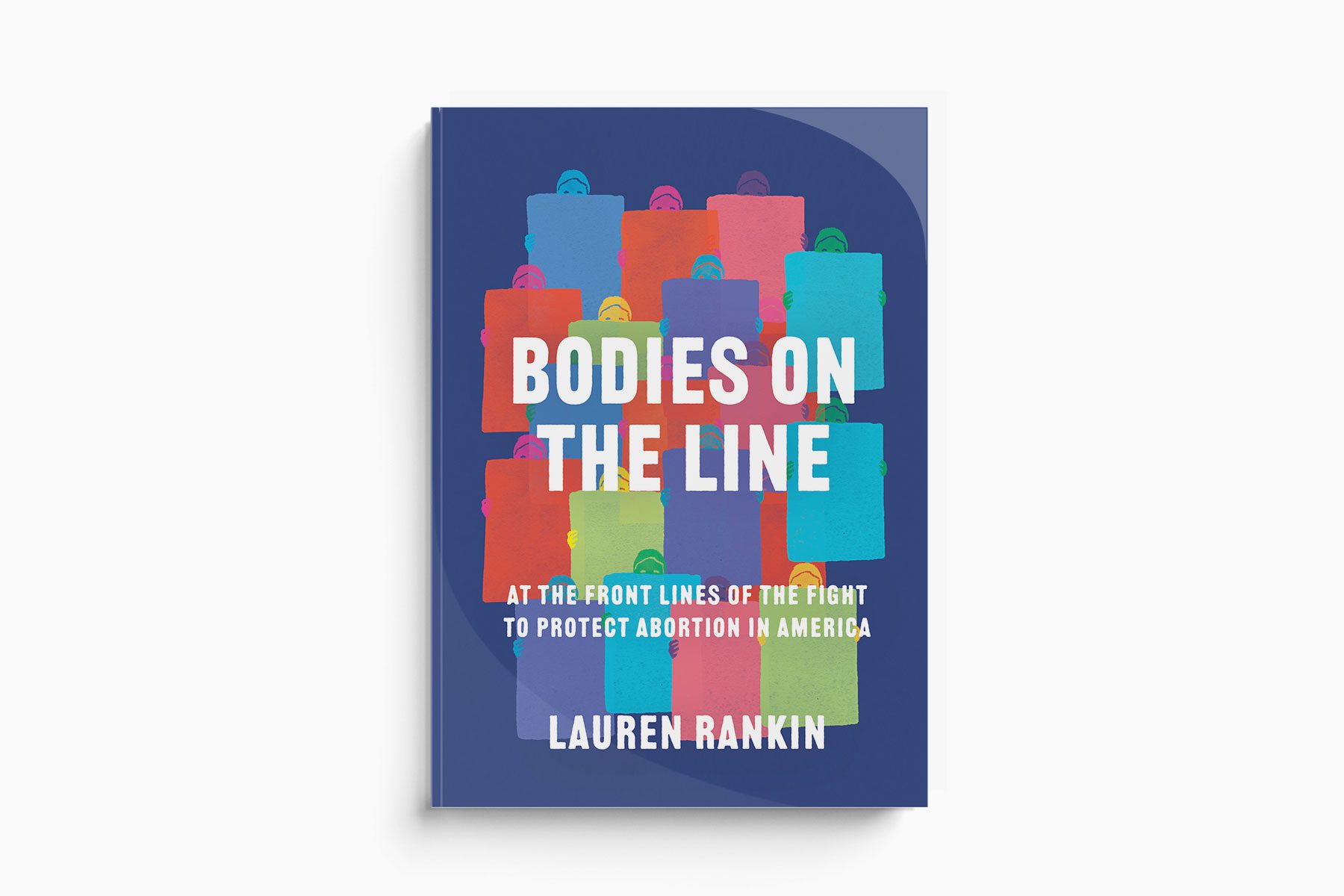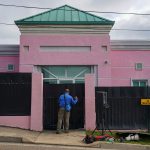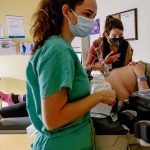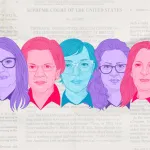Oklahoma just made it a felony to perform an abortion. Before federal courts blocked the law, Kentucky became the first state in the country where clinics could no longer provide abortion care because of the number of legislative restrictions. Idaho is on the brink of banning the procedure after six weeks’ gestational age. Florida, West Virginia and Arizona are all primed to ban abortion after 15 weeks. And observers believe the Supreme Court could weaken — if not totally overturn — Roe v. Wade this summer.
Clinic escorts — volunteers who help guide patients from parking lots often filled with protesters — aren’t surprised by this assault on reproductive rights, says Lauren Rankin, an activist, journalist and the author of the new book “Bodies on the Line: At the Front Lines of the Fight to Protect Abortion in America.”
“The writing has been on the wall for a long time,” Rankin told The 19th.
As Rankin’s book explains, clinic escorting emerged out of the almost immediate wave of hostility and violence toward abortion clinics in the years after Roe was decided. As anti-abortion activists began murdering and attempting to murder abortion providers in the early 1990s, clinic escort work became more prevalent as a means to show public support for providers and help make abortion more accessible to patients in the face of increased street picketing. Though abortion was in theory legal as soon as the Supreme Court issues their ruling on Roe, it remained inaccessible to so many patients for a myriad of reasons — and physically being able to walk in for their appointments at abortion clinics without being harassed was one of them. Clinic escorting became a way to bridge that gap.
Rankin, herself a former clinic escort, says that the volunteer escorts she spoke with for her book’s history of this activism have not only witnessed the strategies and goals of the anti-abortion movement for decades but are committed to continuing the work of making legal abortion accessible. The 19th spoke to Rankin about her book and what clinic escorting means now, the way this work has anticipated this seeming legislative stranglehold on abortion access, and what reproductive justice work will continue to look like should Roe fall.
This interview has been edited for length and clarity.
Jennifer Gerson: What do you think is important for people to be thinking about in terms of what clinic escorts have seen through the years and what this tells us about the ways that the anti-abortion movement has evolved?
Lauren Rankin: It was clear to abortion opponents in the 1980s and 1990s, “OK — we’re not giong to be able to overturn Roe v. Wade outright.” After they failed to do that with Planned Parenthood v. Casey in 1992, their goal was, “Let’s make it as difficult as humanly possible for people to access abortion.” So that meant they would blockade clinics. They would try to shut clinics down. They don’t need to do that anymore, because you don’t need to block a clinic if the clinic doesn’t exist.
A lot of the really confusing and scary tactics we are seeing on the far right right now all originated with abortion opponents. Watching people storm the Capitol in the insurrection? Many of these folks were actually anti-abortion terrorists themselves.
What used to be the radical fringe standing outside of a clinic, those people are now in the government and in the federal judiciary.
The worst protesters at the clinic where I used to [be a clinic escort] were all young men who would stand there and scream. We normalize that so much in this country.
It’s not a fight between two sides. It’s one side fighting and screaming at the other side who are trying to protect some semblance of humanity and dignity for people. It’s not a culture war. One side is in a war and the other side is saying, ‘I don’t want to fight about this, I just want to get health care.’ It’s not political for people who want to have abortions. They just want to have the abortion and move on with their life.
Can you describe a typical day outside of an abortion clinic for patients coming in?
Imagine you’re walking to a doctor’s office — maybe you’re a little nervous if you’re getting an abortion, maybe you’ve never had one and you don’t know what it’s like. You just want to get in there. You just want to talk to the doctor. You just want to have your procedure.
You pull up to the clinic and you see people in neon vests on one side and on the other side there’s a group of folks with signs screaming and it’s just noise, yelling. You think, “What the hell is going on?” Then someone in a neon vest rushes up to you to beat someone else from getting to you first to say, “Hi, there are protesters here — can I walk with you? I will walk with you and stay focused on me and just listen to my voice” while dozens, maybe even hundreds, of people are screaming, “You’re a murderer. You’re going to hell. You’ll still be the mother, just the mother of a dead baby.” People are pulling out their iPhones and shoving them in your face, filming you and telling you that you are going to die when you go inside that butcher shop.
All of that is happening right in your face. I don’t mean six feet away, like social distancing. I mean literally in your face. Even if you have had an abortion before or have told yourself to prepare for protesters, this experience is so intense. We feel that as escorts. People just look at you like, “Why is this happening to me?”
There are federal laws surrounding what protesters can and cannot do in terms of accessing an abortion clinic. How do protesters balance what is legal and not legal?
What is not legal doesn’t actually matter out there — who is enforcing the law is what matters. Technically, it is a violation of a federal law and a felony to block access to an abortion clinic or to intimade someone trying to access a clinic. However, how is that enforced? You have to have law enforcement.
The FACE [Freedom of Access to Clinic Entrances] Act prevents people from using their bodies to physically block access to a clinic, but the law doesn’t address what happens up until that point. It’s been the law for nearly 30 years and it’s basically worked at stopping protesters from physically blockading a clinic. But what the law doesn’t address is what we do about everything up until that point. So maybe you can’t stand in front of a door to block it. But what if you move around in front of the door, is that legal? Well, it depends on how we’re enforcing the law. Can you film someone walking into a clinic? If it’s a public sidewalk, that can be legal.
Also, what does it mean if you call the police to a clinic? To Black and Brown patients, this might signal a lack of safety. What the law is and then what we believe is just and fair are not always the same things.

Right now we’re in a moment where we are seeing an unprecedented number of bills in statehouses that are effectively shutting down all clinics and all abortion access in a state and we’re on the brink of seeing if the Supreme Court is going to uphold Roe or not. What do you think clinic escorts would say about this moment?
I think that clinic escorts have understood for a long time that the law won’t save us and that we will have to do that for ourselves. That’s why clinic escorting emerged in the first place.
Roe was established as the law of the land, but by the late ’70s, you already had the Hyde Amendment and so many virulent protests at clinics, and the law did nothing to address any of that. Roe was just a sticker we smacked on the issue and then said, “OK that’s solved and great,” but that’s never been the reality on the ground, especially not for marginalized folks, for Black and Brown patients, for undocumented patients, for low-income patients.
I fully expect that the Supreme Court will overturn Roe v. Wade. I believe and expect that half the states in our nation will then ban abortion. But the law is irrelevant. We’re going to have people who still need care and people like abortion funders, practical support organizations and clinic escorts who are going to be doing what we’ve been doing all along, which is finding a way to bridge the gap.
What do you hope people take away from the history of clinic escort work in this moment?
My book basically says that we can’t do anything about the Supreme Court. I do not mean that I think it’s fruitless to protest. I think it is a moral imperative to protest injustice, but we can’t actually do anything to change Amy Coney Barrett’s vote, Brett Kavanaugh’s vote.
What we can do is so much smaller and may feel less important, but it can be so meaningful. That is what clinic escorting has taught me. My small contribution of just walking with someone and holding them [to help shield them from the crowds while walking in] and saying, “It’s OK” helps that person do what they already wanted to do with their life. It is so tiny and so small and so miniscule, but it’s also the entire point.
What is the evolution of this work in places where someone doesn’t even have the option of walking into a clinic in their state, whether because Roe is overturned or because that state simply makes abortion too hard to access?
If clinics simply don’t exist anymore, not a single clinic escort I spoke with for my book said, “Oh, well then I will just go on with my life.” People are dedicated to this issue because they understand the human stakes, and these people know that just because your clinic closes, that doesn’t mean that your sense of duty to the people you serve eradicates. Many have told me that they have become involved with practical support organizations that provide transit, lodging, or funding for gas and child care.
That is a huge area for growth and they will need an unbelievable amount of resources if we’re about to need to move everyone from [about a third of the country to the rest of the country].
I refuse to be hopeless. That’s basically the point of the book. I just refuse to be hopeless.







